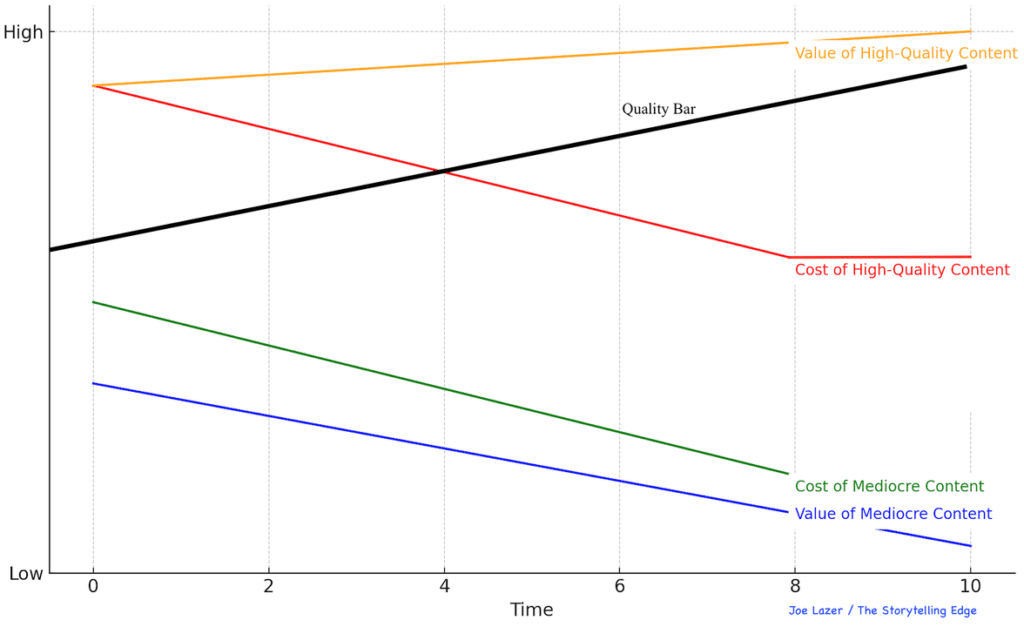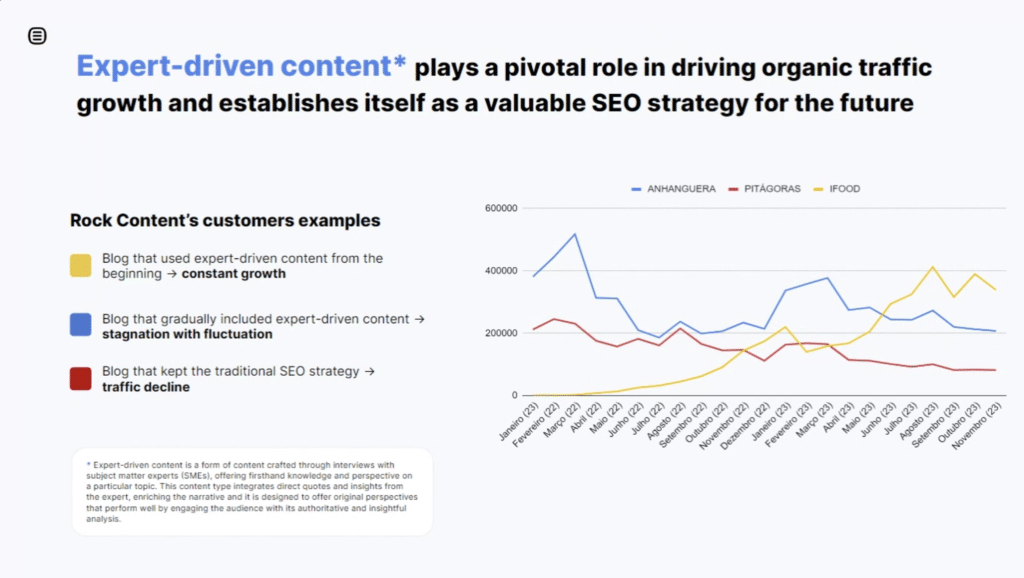No products in the cart.
Content Marketing
How to Create Content That Will Rank in 2024
Download this post by entering your email below
User behavior evolves every day. In a post-pandemic and AI-boom society, this is more apparent than ever.
People are changing the way they create and consume content online, the way they search, and the way they interact with each other and with brands.
Naturally, the entire internet infrastructure (Search Engines, social media, news websites, etc.) has been adapting to meet this new behavior.
Google is a good example.
Last year, we saw a clear path from the search engine giant toward prioritizing quality content, and more recently, this month we witnessed one of the largest and most impactful Core Updates that completely deindexed low-quality sites.
Alongside this, the new Search Generative Experience promises to completely change the way we interact with the SERP today.
Indeed, Google is adapting. And quickly.
And for us, brand owners, marketing, and SEO professionals, it’s impossible not to ask the question: how do we create content that will rank in 2024?
Here at Rock Content, we’ve been closely monitoring every change for some time now – from the rise of new AI tools to Google updates and user behavior.
After several tests and after piloting new models in the way we produce content (for us and our clients), I’ve gathered key insights based on recent studies, our experience, and real data, to help you tailor your content for the future of SEO. Follow along with me.
Search Generative Experience: What Does the Future of the SERP Look Like?
Before we delve into content creation strategies for 2024, it’s crucial to understand the evolving landscape of search engines. I highly recommend reading our dedicated article on the Search Generative Experience (SGE) to gain a deeper insight into this concept.
Here, I’ll briefly explain how Google’s SERP will evolve in the near future, because of the influence of AI, to help you better understand the content tactics that I’ll share later.
Read also: Search Generative Experience: What Is It & How Does It Impact SEO
As I said, Google’s algorithm is changing. And we need to pay attention to its evolution to continue generating organic traffic.
How Does The Google SERP Work Today?
Today, Google works with search intent according to the searched keyword. The algorithm seeks to present web results that will best answer the user’s question. When the answer is very objective, it presents a preview of the page on the SERP, through the snippet features.
Rock Content’s blog in the “zero” position of SERP for the keyword “Interactive Content”, included in the snippet features
Now, if the question is complex, Google tries to present the closest results related to the topic. Sometimes, if there is nothing so specific that has already been published by third parties, it is not able to help.
When we ask very specific questions, Google shows the results that better fit our search intent, but rarely does it find the exact answer we need. In the previous example, Google has left behind the “200 dollars” part of my search, and shows head-tail articles instead of providing the specific answer I requested.
The algorithm, in a way, forces people to simplify their questions. It prioritizes its results pages trying to direct the user to the best answer, considering mainly the following attributes:
- Well-organized information;
- Objective questions and answers;
- Expertise and authority;
- Interactivity within the pages;
- Strategic linking;
- Multimedia materials;
- Structured data;
- Usability.
How Will Google SERP Work with AI (Search Generative Experience)?
The example above is still being tested, but Google showcased it here as a preview of what’s to come.
Google SGE is an AI-powered feature added to the Google Search interface that everyone already knows and loves. It leverages the power of AI technology to enhance search results, offer handy SERP overviews, and streamline the process of browsing the web.
As you can see, Google continues to deliver simple answers as it always did, but now it is less dependent on the availability of an external page that responds to that search intent. Google itself presents an answer through AI.
In other words, Google is now able to answer unique and specific questions, like the one in the previous example.
Does it mean that SEO is dead?
Raise your hand if you’ve heard something like that this year (people always try to kill SEO every once in a while).
No, quite the opposite. SEO is more important than ever, and it’s stepping up its game.
You see, Google is still a primary search engine. We still don’t know how Google will give credit to content that generates answers through AI-driven searches. We need to wait and see.
Read also: SEO in the Age of AI Search
However, it’s important to remember that even as the Search Generative Experience integrates into our search habits, our familiar traditional SERP will still be present, positioned just beneath the AI-generated response.
But we also need to remember that, even when the Search Generative Experience becomes part of our search routine, we’ll still have, just below the AI-generated answer, our well-known traditional SERP, with fewer result options on the first page and prioritizing the same structure and content quality.
Now, transitioning to this topic…
Google March 2024 Core Update and The Move Towards Content Quality
Google has emphasized the importance of high-quality, helpful, reliable, and people-first content for some time now. We saw numerous Core Updates last year, all pointed to this focus.
In March 2024, this became clear: the latest Core Update aims to reduce low-quality, unoriginal content in search results by 40%. We have a comprehensive article explaining all the details about this Core Update, which I highly recommend you read here.
But the bottom line is: You can’t stick with the same content and SEO strategies and expect similar growth.
We’re facing new ways of interacting and distributing content, with the same golden rule. As stated by Google Search Liaison on X:
“Google’s key advice is to focus on doing things for your readers that are helpful. For example, if it makes sense for your readers to see a byline for an article (and it might!), do it for them. Don’t do it because you’ve heard having a byline ranks you better in Google (it doesn’t). Put your readers and audience first. Be helpful to them. If you do this, if you’re doing things for them, you are more likely to align with completely different signals we use to reward content.”
Where does AI-generated content fit into this equation?
Perhaps you may have heard that Google is penalizing AI-generated content. Well, I need to clarify that the search platform hasn’t made any direct statements regarding penalizing content created by Artificial Intelligence.
However, when we understand that quality content is what Google is prioritizing now, I invite you to reflect.
In 2024, the extensive adoption of Artificial Intelligence has made content creation more accessible than before. However, this has also increased the risk of producing, disseminating, and consuming subpar, superficial, inaccurate, and mediocre content.
When we examine most of the sites that were deindexed after Google’s update, what we find is a pattern of mass-produced AI-generated content with very little (or none at all) human editing, resulting in generic, shallow, outdated content that violates Google’s spam guidelines.
This means that brands will need to create even better content, as the bar for quality and user expectations only continues to rise. High-quality content becomes vital to differentiate oneself and achieve results.
The value and potential for results of mediocre content will plummet (blue line), while the value and potential for results of high-quality content will increase (orange line). (Via LinkedIn)
In a world where AI decreases the effectiveness of SEO, good content is worth its weight in gold.
So… What Is The Future of SEO? And How Can We Be Prepared?
Now that we understand where Google is heading, it’s time to get practical: how do we adapt our content strategy to ensure it meets the expectations of the future SEO guidelines?
We can divide the best SEO planning practices into two fronts:
- Strategy for choosing topics;
- Essential elements of on-page optimization.
Let’s explore each of these separately.
Strategy for Choosing Topics
The main premise should be to produce content focused on user experience, transmitting experience, expertise, authoritativeness, and trustworthiness (E-E-A-T). This means producing content with new information and approaches, which AI tools cannot produce, to gain a competitive edge.
In practice, the focus should be on topics that:
- Demand in-depth analysis;
- Help the user make individual decisions based on their context;
- Transmit human expertise and a higher level of specialization;
- Explore information related to recent contexts and events, prioritizing originality.
Case Study: Trending Keyword
As I mentioned, everything I’m presenting in this article is based on research and facts, and most importantly, on our own experience. We’ve run a series of tests and updates to our own strategy, as well as that of our clients, to ensure our numbers continue to grow in a reality where many sites are losing traffic.
Here are the components integrated into the blog posts utilized for testing:
- An in-depth analysis;
- Expert insights;
- Originality;
- And, most importantly, a context that is both timely and trending
In July 2023, we capitalized on the buzz surrounding the Barbie movie to create an article about the “Marketing of the Barbie Movie” — which quickly became the most accessed article of the month, bringing a peak in traffic beyond the evergreen articles.
This article was written by one of our Content Specialists, who ingeniously brought her expertise not only as a Marketing professional but as a fan of “Barbieland” to create a unique, highly timely article, relevant to our audience, with updated data, that rode on a trending keyword of the moment.
Essential Elements of On-Page Optimization
In addition to the strategy adopted in choosing topics to explore, some elements need to be prioritized to guarantee an advantage over the competition.
Features that should be prioritized during content production include:
- Incorporating expert quotes with proper attribution hyperlinks to their professional networks;
- Clearly identifying authors and their qualifications/experience;
- Integrating multimedia elements such as videos, infographics, embedded materials, etc, aiming to provide complementary information and reinforce the content search intent;
- Utilizing data and insights from reputable research institutions and relevant bodies in the field;
- Using interactive content pieces embedded such as mini quizzes and calculators to provide a personalized experience and help to make decisions individually.
How Does It Look in Practical Terms?
Let’s take, as a practical example, how some blog post titles should follow the tactics we discussed here:
Examples that worked before Google’s changesMore functional examples now, for the future of SEODiscover 7 professions of the future
Professions of the future: researchers point out the main ones
How to open a restaurant?
Opening a restaurant: experiences of those who have been successful
How to make an app? Understand the process
How to make an application? Dev explains
How to standardize processes in company management?
Process standardization: expert lists 5 secrets
What is an electronic document?
Electronic document: lawyer explains the uses
Case Study: Expert-Driven Drives Organic Traffic Growth
Another case study that supports our hypothesis, this time from our clients (whose names we’ll keep confidential), demonstrates how using expert-driven content can generate traffic growth. Take a look at the graphic below:
Expert-driven content is a form of content crafted through interviews with subject matter experts (SMEs), offering firsthand knowledge and perspective on a particular topic. This content type integrates direct quotes and insights from the expert, enriching the narrative and providing original perspectives that engage the audience with authoritative and insightful analysis.
As you can see, blogs that have consistently implemented expert-driven content from the outset demonstrate a clear pattern of constant growth.
In contrast, those that have gradually introduced expert-driven content show signs of stagnation with occasional fluctuations. Moreover, blogs adhering to traditional SEO strategies without adapting to content specialization are facing a decline in traffic.
These insights underscore the importance of expert-driven content in staying competitive and achieving sustainable growth in the current SEO climate.
The table below also showcases improvements achieved in just three months by one of our clients (which, again, we’ll keep the name confidential), including a 398% increase in CTR (Click-Through Rate) and a 67% rise in SERP (Search Engine Results Page) positioning.
It’s important to clarify that we have clients from various sectors. To ensure we delivered expert-driven content that reflected the expected quality, we relied on our pool of 15,000 talented writers within WriterAccess, our talent marketplace.
We also adopted an interview process with specialists to ensure current and relevant quotes. The results speak for themselves.
Here is a significant note:
In this article, I’ve emphasized actions necessary to enhance your content strategy and secure a competitive edge in this new era of SEO changes.
In addition to the tips provided here, good SEO practices remain crucial, so remember to craft a solid content plan, run keyword research, implement link-building strategies, optimize on-page and off-page elements, etc.
f you require assistance with the essentials, , you can explore our Complete SEO Checklist provided here.
Wrapping up
As you can see, producing personalized, humanized, and high-quality content is essential to attract the user’s attention and also succeed in the future of search engines. So, the focus of your SEO content production should be on these elements in 2024.
If I can give you a final hint, I recommend you explore WriterAccess and discover how our talent creators can assist you in creating content that not only endures but also thrives in the future of SEO. You can sign up here for a 14-day free trial.
Is your company ready for the future?


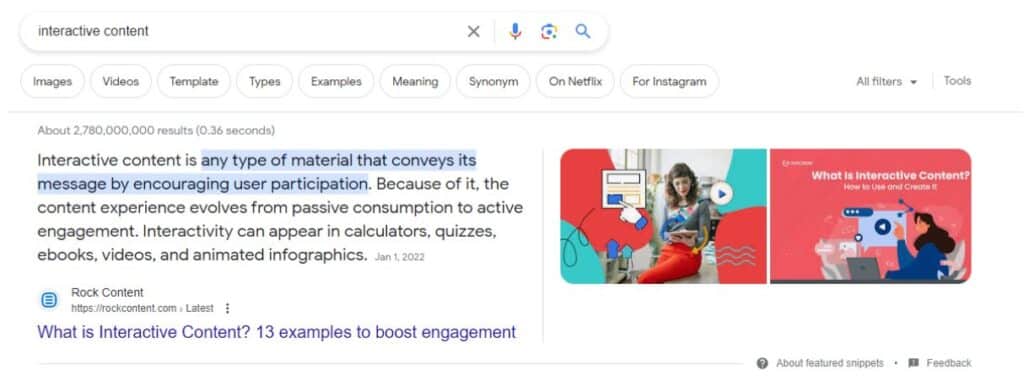
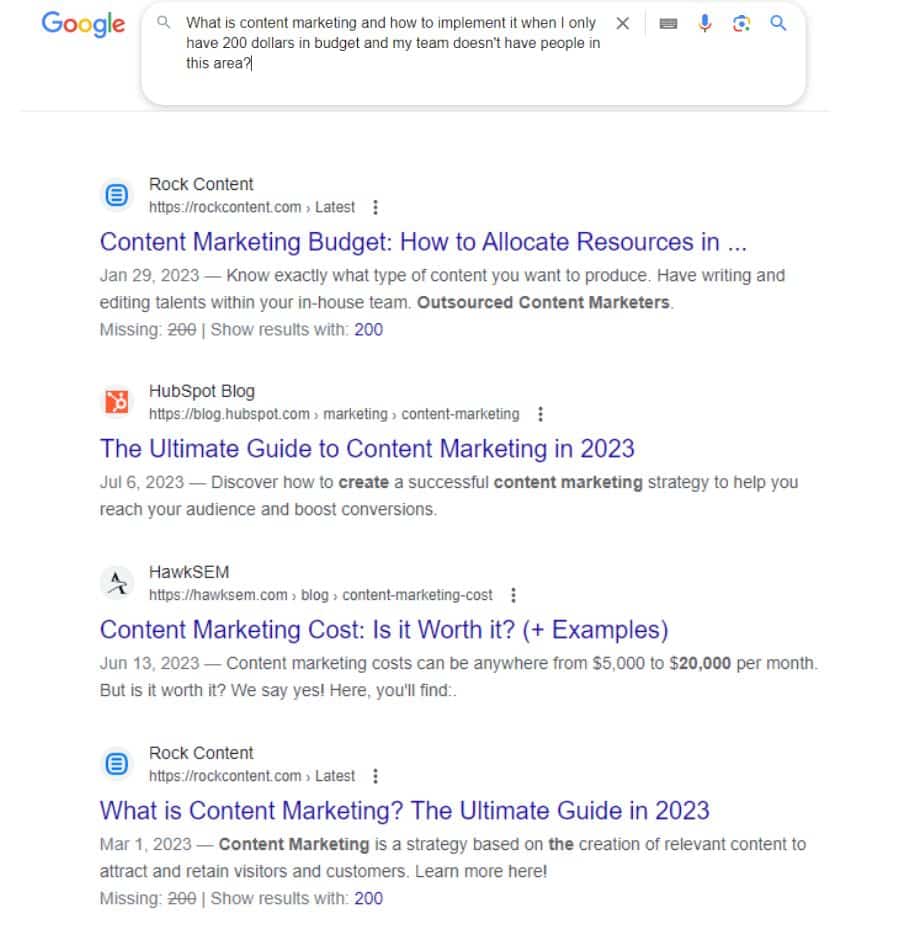
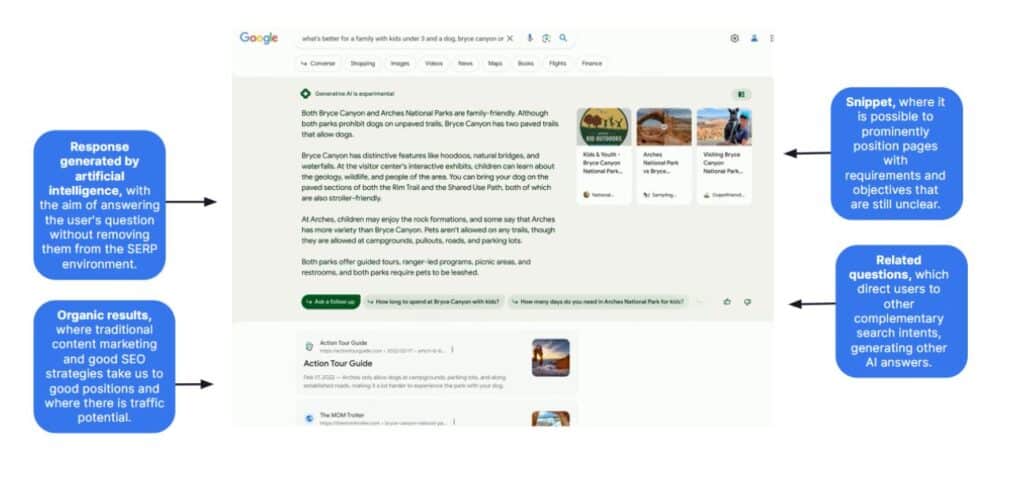
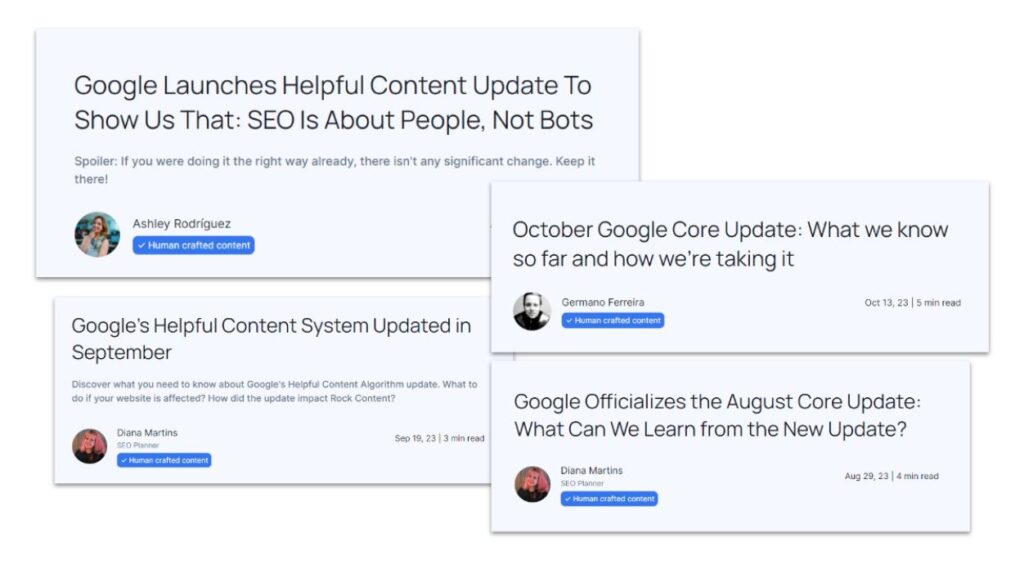
![[Rock NA] State of Marketing Reports 2024 – Comkt Hubspot State of Marketing Report 2024](https://rockcontent.com/wp-content/uploads/2022/07/Banner-Fino-Rock-Convert-2500-%C3%97-500-px-19.png)
